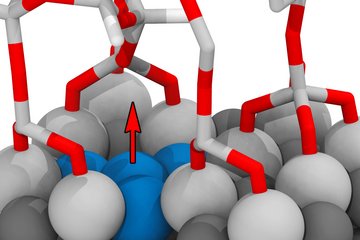All genres
81.
Talk
Corrosion at the Quantum Level. Coffee with Max Planck, virtual seminar organized by the MPIE, Düsseldorf, Germany (2021)
82.
Talk
Realistic description of processes at solid/liquid interfaces by ab initio molecular dynamics simulations with potential control. MRS 2021 Fall Meeting, Hybrid Conference, Boston, MA, USA (2021)
83.
Talk
Insights into the stability and reactivity of solid/liquid interfaces from ab initio calculations. 71st Annual Meeting of the International Society of Electrochemistry "Electrochemistry towards Excellence", virtual, Belgrade, Serbia (2020)
84.
Talk
Artificial Photosynthesis. BMBF-DOE bilateral workshop, Virtual Discussion, Berlin, Germany (2020)
85.
Talk
Predicting atomic structure and chemical reactions at solid-liquid interfaces by first principles. Operando surface science – Atomistic insights into electrified solid/liquid interfaces (708. WE-Heraeus-Seminar), Physikzentrum, Bad Honnef, Germany (2019)
86.
Talk
First-principles appraoch to model electrochemical reactions at solid-liquid interfaces. ACS 2019 Fall Meeting & Exhibition, San Diego, CA, USA (2019)
87.
Talk
Degradation processes at surfaces and interfaces. ISAM4: The fourth International Symposium on Atomistic and Multiscale Modeling of Mechanics and Multiphysics, Friedrich-Alexander Universität Erlangen-Nürnberg (FAU), Erlangen, Germany (2019)
88.
Talk
Ab initio approach to electrochemisty and corrosion. Computational Materials Chemistry Workshop, Telluride, CO, USA (2019)
89.
Talk
Building an ab-initio potentiostat in a standard DFT code with periodic boundary conditions. ELRC2019 - IPAM reuniuon workshop, Lake Arrowhead, CA, USA (2019)
90.
Talk
A fully ab initio approach to modelling electrochemical solid/liquid interfaces. Chemiekolloquium der Johannes Kepler Universität Linz, Linz, Austria (2019)
91.
Talk
High-throughput optimization of finite temperature phase stabilities: Concepts and application. DPG Frühjahrstagung der Sektion Kondensierte Materie, Regensburg, Germany (2019)
92.
Talk
First-principles approach to model electrochemical reactions at the solid-liquid interface. Spring Meeting of the German Physical Society (DPG 2019), Regensburg, Germany (2019)
93.
Talk
Modelling structural materials in realistic environments by ab initio thermodynamics. Hume-Rothery Award Symposium, TMS2019 Annual Meeting and Exhibition, San Antonio, TX, USA (2019)
94.
Talk
Extending First-Principles Calculations to Model Electrochemical Reactions at the Solid-Liquid Interface. Towards Reality in Nanoscale Materials X, Levi, Finnland (2019)
95.
Talk
A fully ab initio approach to electrochemistry and corrosion. CNLS Colloquium, Los Alamos National Laboratory, Los Alamos, NM, USA (2019)
96.
Talk
Modelling electrochemical solid/liquid interfaces by first principles calculations. 19th International Workshop on Computational Physics and Material Science: Total Energy and Force Methods, ICTP, Trieste, Italy (2019)
97.
Talk
Ab intiio modelling of solid/liquid interfaces: Challenges and insights. DESY Seminar, Hamburg, Germany (2018)
98.
Talk
From semiconductor defect chemistry to electrochemistry: Challenges and insights. AMaSiS 2018 Workshop, Weierstrass Institute for Applied Analysis and Stochastics, Berlin, Germany (2018)
99.
Talk
Stability and reactivity of solid/liquid interfaces from ab initio calculations. International Workshop on Computational Electrochemistry, Aalto University, Helsinki, Finland (2018)
100.
Talk
Insights into electrochemical problems from the perspective of semiconductor defect chemistry. International Workshop on Computational Electrochemistry, Aalto University, Helsinki, Finland (2018)











